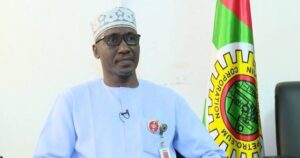During an interactive session on “Exiting Petroleum Subsidy: Ensuring Self-Sufficiency in Domestic Refining of Petroleum Products” organised by the Senate Joint Committee on Petroleum Resources (Upstream and Downstream) on 16 June, 2020, the Group Managing Director of the Nigeria National Petroleum Corporation (NNPC), Mallam Mele Kyari, revealed that Nigeria lost $48 million to pipeline vandalism and crude oil theft between January and June 2020.
 He said that the amount was lower, compared to losses recorded in the past, citing that the country lost $825 million and $725 million, in 2018 and 2019 respectively. The reduction in the activities of smugglers and vandals was as a result of intensified efforts by relevant security agencies. He pointed out that since the pipelines were being destroyed within townships and not in the bush, there was connivance amongst security agencies, contractors and community leaders.
He said that the amount was lower, compared to losses recorded in the past, citing that the country lost $825 million and $725 million, in 2018 and 2019 respectively. The reduction in the activities of smugglers and vandals was as a result of intensified efforts by relevant security agencies. He pointed out that since the pipelines were being destroyed within townships and not in the bush, there was connivance amongst security agencies, contractors and community leaders.
Kyari said that the corporation had completely handed over the security of the nation’s oil pipelines to security agencies, as “it is their work to secure government property.” He was also of the opinion that the only way to stop activities of vandals was to completely remove fuel subsidy.
He made a shocking revelation about having no idea of the nation’s daily petroleum consumption. In his words, “We don’t know how much petroleum we consume daily in this country, but we know how much of product is taken out of the depot.” About 54 million litres of petroleum products are taken from the depots daily but the consumption level is believed to be below that.
The NNPC boss also stated that the corporation had no idea about the exact amount of fuel transported from Nigeria to neighbouring countries, saying, “It is impossible to know, nobody declares it, and therefore as it crosses, it goes.”
He noted that the price of fuel at the borders was higher than the official rate. “There are open borders across the West African sub-region. It is impossible to stop cross border supply of products. No amount of policing or control that anyone can put in place that can stop that,” he added.
He said that the removal of subsidy would help stabilise the market and the corporation was working with the Central Bank of Nigeria to also stabilise the forex market so that oil marketers could easily access it and get the product at market price. He added that Nigeria could not meet the benchmark of 1.8 million barrels of oil per day in the revised 2020 budget recently passed by the country’s National Assembly.
Kyari also stated that NNPC had shut down the country’s three refineries (Kaduna, Port Harcourt and Warri refinery) deliberately because they were producing at a loss. He said that the transporting pipelines had not been properly maintained over the years and the cost of replacement was very high. He said that even though N64 billion was spent on the resuscitation of the Kaduna refinery, it still yielded no positive result. He revealed that there were plans to fix the refineries.
Excerpts from the GMD:
“Until March this year, there was no subsidy on aviation fuel, but the one we couldn’t walk away from is subsidy on PMS.
“We have never seen this price collapse in the history of oil. The price fell from 50 dollars per barrel to less than 10 dollars and no country is prepared for this. Nobody saw it coming. The result of this is revenue collapse, because there is a direct correlation.
“Today, in our effort to ensure price stability in collaboration with the rest of the world, our daily crude oil production is at 1.48 million barrels per day.”
“We are better off producing 1.7 million and once the price gallops up to 45 dollars, we can accommodate the difference.
“There is such a condition that we can only extract 70 to 80 percent of the value of a crude. It is needless to operate it when you know you will lose 20% of the value.
“Second is that we cannot even guarantee crude oil supply to these lines.
“From Excravos to Warri and then to Kaduna; Bonny to Okrika, the pipelines are very old – some are 30 to 40 years old – and have not been replaced, and all the activities of the vandals that happen every day, if you put them under pressure that they are designed for, you cannot guarantee required crude oil supply except they are replaced.
“We have not done proper maintenance in the last 30 years, and the cumulative effect is that even when you start it today, it cannot be run optimally.
“You cannot do anything except you replace the pipeline and the cost of replacement is very high. To replace pipeline from Excravos to Kaduna, you need at least $2 billion, and we don’t have that kind of money.
“Why people don’t build refineries here is for a very simple reason. When they process, at what rate will they sell the product? Can they recover their cost? This is why no bank will put its money, nobody will proceed with building of refineries.
“The only way we can have that development is to support the market-based regime or you assure them that when they produce, you buy the product from them at a price they want to deliver it at the market. And that is not an option.
“The option we have is to allow the market to run. You will see activities at the refinery subsector when there is total removal of subsidy.”